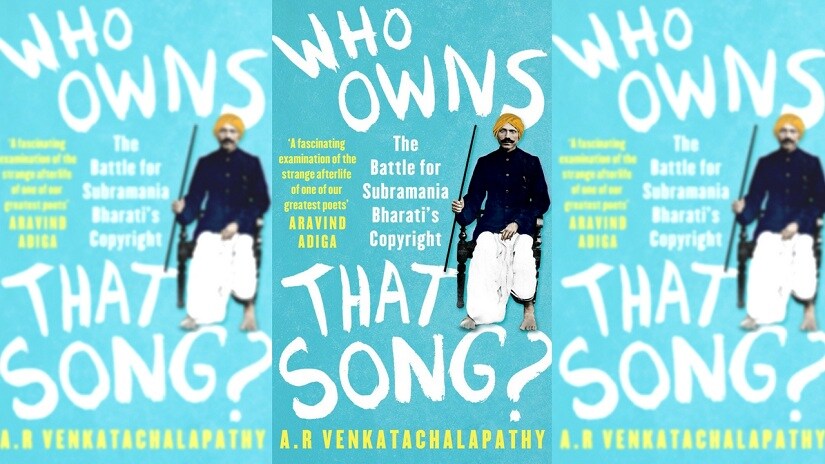Beginning, as it does, with a section titled ‘Dramatic Personae’, AR Venkatachalapathy’s new non-fiction book Who Owns that Song? The Battle for Subramania Bharati’s Copyright left me with one overwhelming thought: This would make for an entertaining period film. He introduces the characters in a manner of a montage that picks factual glimpses from their lives. Yet, he layers these truths with a character sketch that teases and hooks the reader into the book. Sample this: “P Jeevanandam. Communist agitator who can stir public emotion through his selfless work and fiery speeches.” What role might a “Communist agitator” have in a copyright lawsuit? A charming surprise awaits us. He follows this by establishing the mise en scène. In a chapter titled ‘Copyright Claws’, he discusses the idea in its early days, slowly detangling property rights, subsidiary rights, moral rights and fair use around works of art. He is careful to warn us that the infantile literary scene all those decades ago didn’t have this understanding an understanding of the subject. [caption id=“attachment_4455613” align=“alignnone” width=“825”]  Throughout his book, AR Venkatachalapathy keeps the mystery of Subramania Bharati alive, even if we know how his story ends[/caption] At the end of this prologue, he launches into flashback: “135 years back in time to India’s southern corner, Ettayapuram.” After several location shots, we finally encounter the premise of the story — the “unsung poet” Subramania Bharati. He draws a meticulous and sharp portrait of Bharati, based on events that occurred both during and after his life. He isn’t hagiographical, and raises his weapon of biting wit every now and then. He doesn’t shy away from a little melodrama either, even if he is unconvinced of its accuracy. While writing about Bharati’s interaction with Sister Nivedita, he remarks, “More dramatically, if apocryphally, she is said to have torn her robe, pointed to her skin and asserted that unless Indians developed a hatred for white skin, India had little hope of liberation.” In Venkatachalapthy’s portrait, we see the journey of a young man through states, ideologies, struggles, work and relationships, that leaves us feeling melancholic for a life gone too soon. Yet, in this story, Bharati is not the hero. His life is simply the explanation for why his poems became important to the Tamil people. This melancholy is only deepened when the reader meets Chellamma, Bharati’s widow, who lived a life of poverty and got no part of the profits that his work generated, albeit posthumously. By the end of act one, the drama intensifies. In the first conference of Tamil writers, fervently following the tradition of Tamil oratory, we begin to hear loud calls for “rescuing the poems of Bharati from the clutches of private individuals”. From here, the book picks up speed, dramatically introducing each prominent character, in fact, in what is now called ‘mass’ elements. It is here that we meet the heroes. Sample this line written by the author: “Ramaswamy Reddiar was not a man to seek office but when it came knocking at his door, he was not one to forsake it either.” To any Tamil speaker, this sounds like, “Thaana sandaikku poga maattaan, Vandha sandaiya vidamaattan,” (he would never pick fights, but when fights came knocking at his door, he wouldn’t forsake them either), setting up Reddiar as our hero in this fight. Then comes Avinasilingam, the unrelenting task-master, the administrator who is entrusted with walking the last mile. Venkatachalapathy also builds character sketches of the antagonists, albeit cautiously. He quotes Viswanathan, Bharati’s half-brother who owned copyrights to his poems, as saying, “I was looked upon as the public enemy number one, I was likened to a monster…” Through the chapters, everyone makes their case, including the nationalists, agitators, copyright owners, businessmen, family, friends, publishers and readers. Protests grow louder, negotiations move faster, and the government isn’t giving anyone enough rope. “One day in the first week of March 1949, a motorcycle-borne messenger arrived at Meiyyappan’s house and delivered a ‘very urgent’ message: He was asked to meet the premier in an hour’s time.” Venkatachalapathy keeps the mystery alive, even if we know how the story ends. The irony hits us after the nationalisation of Bharati’s work for the express purpose of making it available for the use of the public at a cheap cost: For years after, “it was only a pious wish expressed in governmentalese with no mechanism for realising this vision.” Venkatachalapathy transfers the restlessness felt by the Tamil public during this time squarely to the reader — who has already experienced the high of winning the battle, but now feels like she has lost the war. Venkatachalapathy’s biggest success with Who Owns that Song? is in the simplicity of his language, with an endearing trace of academese. His biting wit and commentary recreate history for us. He writes a legal drama, investing keenly in the characters and the environment that made them possible. In telling the story of a legal tussle involving Bharati’s poems, he presents a gripping view of the life and times during the Independence era. If you even have a tangential interest in Bharati, copyright or the history of Tamil Nadu, you have no excuse not to grab this book with both arms.
In this book, Subramania Bharati is not the hero— his life is simply the explanation for why his poems became important to the Tamil people | #FirstCulture
Advertisement
End of Article


)
)
)
)
)
)
)
)
)



